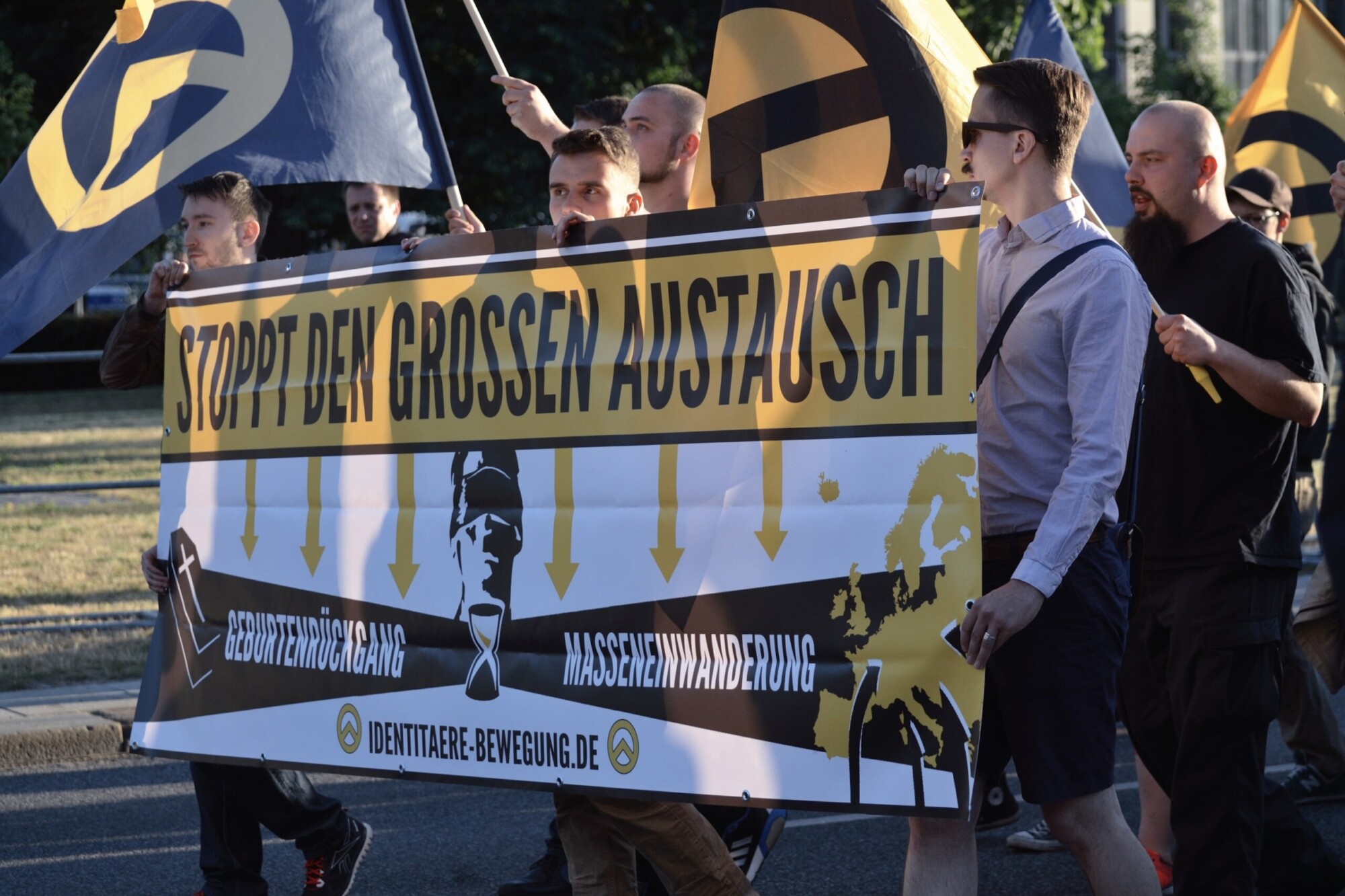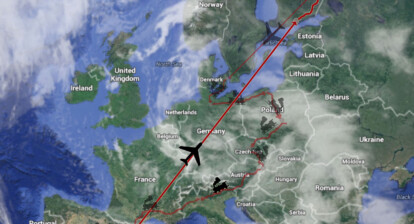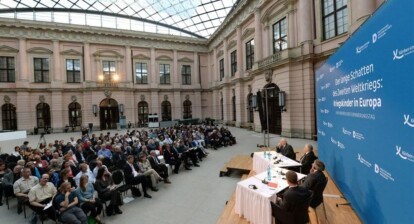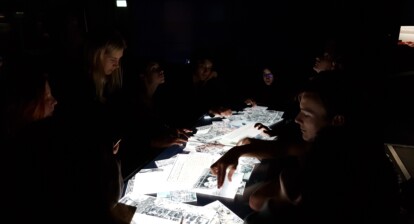After a long camapaign the Austrian Voters finally elected Alexander von der Bellen as the new president. The candidate of the far-right party FPÖ, Norbert Hofer, got more than 46 percent of the vote. With this, the FPÖ, a party which is strongly connected with the new emerging right-wing movement of the Identitarians, has found its path into the centre of the Austrian society. But who are the Identitarians? What do they stand for, and how will this change the Austrian society?
Inside the Identitarian Movement: A Glimpse at Extremism
Phillip H is on the door and ushers me in. In his effusive words of welcome, he says how delighted he is to see so many new faces. We exchange some small talk before he assigns me to my place. As a newbie to such get-togethers, I sit together with other, less senior members of the movement at the lower end of the table. The people sitting around me appear to be much more of a mixed bag than those at the leadership level. They include pensioners, full-blooded hooligans, unskilled workers and dapper businessmen. Alongside them, dishevelled unemployed men around the age of 50 talk to teenagers, 18 years old at most if they’re a day. I have the impression that some of them don’t get out that much.
What Unites Everyone Here is Fear
What unites everyone here is fear about their way of life. And what constitutes this particular way of life is defined in quite different ways. Even so, certain statements crop up time and time again: people no longer recognise their own neighbourhoods, the neighbours no longer speak German, Austria is going to the dogs, we’re reduced to being second-class citizens, the Muslims are taking over our country, and so on.
The participants are grateful for being able to speak up and say what they truly feel without being condemned by others. Many are timid when they talk the first time about their experiences. Very few of those here at the bottom of the table know each other. Like myself, most of them stumbled across this meeting by way of the Internet. But, as I’m constantly assured from all sides with each new round of drinks, “we’re among friends here”. The people next to me keep talking until their fear increasingly gives way to anger. After the third beer, inhibitions gradually fall away. Some of the talk starts turning to which female left wing activists probably need to be fucked more for their own good and which politician should first be chased out of office.
Obsession with “The Great Replacement”
Stephan G and the other high-ranking members of the movement frequently look over to us. Each time they look slightly ashamed. While the hard core of right wing student fraternities – the Burschenschaften – is still more than able to formulate its chauvinism in a more socially acceptable diction, I find myself sitting opposite people who express the same ideas in coarser language.
It’s obvious. My side of the table does not consist of the intellectual right wing elite which the movement so persistently tries to recruit on the web.
Nevertheless, we are all on our best behaviour when we listen to the talks and speeches. Apart from organisational points, the one sole topic really on the agenda here appears to be an overriding obsession among all those in the room: It’s what the Identitarians call “the great (population) replacement”, the death of a nation, based on Renaud Camus’ 2011 book, Le Grand Remplacement. It is the loss of their ethno-cultural identity. Behind every corner lurks evidence pointing to an irrefutable truth which gradually takes shape with each rape perpetrated by refugees and with each terrorist attack the Islamists carry out on Europe. For Europe belongs to the Identitarians. Only they, this elite troop, the spearhead against multiculturalism as they call themselves, this phalanx of the last generation are still able to halt “the replacement”. Only they can see the truth.
The Rhetoric of Superiority: Identitarian Ideals and Misappropriation
Repeatedly, they emphasise how superior they are to the other side. They bang on about liberalism being finished and

A demonstration of the Identitarian movement. (c) Caruso Pinguin https://www.flickr.com/photos/110931166@N08/18817380656/in/photostream/
insist that patriotic forces in Europe are on the rise. Clearly, they say, the left cannot keep up with them, either at a rhetorical or ideological level. Clearly, the Identitarians are willing to make sacrifices and altruistic in their fight for goodness, truth and beauty. At some of these presentations it becomes clear to me: I have never witnessed such an appalling misappropriation of ideas expounded by pioneering conservative thinkers such as Heidegger and his consorts. Even the names and historical legacy of Hans and Sophie Scholl, both active in and executed for their participation in the non-violent White Rose resistance movement in Nazi Germany, are invoked with the aim of legitimising such undignified self-adulation.
Identitarian activists talk about mass deportations and the necessity for people to be ready to put their life on the line. After each of these monologues, I look around and try to work out whether the people sitting next to me have genuinely grasped the violence underpinning such rhetorical flourishes. In my experience, the average Austrian tends to be repulsed by militancy. But the entire pathos and radical self-promotion surrounding such events doesn’t seem to deter my new comrades. In fact, this aesthetically sanitised motif of death goes down rather well with admirers on such occasions.
Preparing for the Reconquista
Members are more than happy to tell me about the “training” they’ve just had, about the books they’re in the process of reading and about the weapons they’re stocking up on in order to be prepared for the D-Day of the reconquista: the day on which the people will rise up to purge themselves of their enemies. These appear to comprise left-leaning politicians, the media, homosexuals, emancipated women, Muslims, asylum-seekers, liberal artists and decadent western civilisation itself.
Any organisation and way of life which does not condone their views represents a threat. Instead of being regarded as a pluralistic collection of different attitudes, such organisations and lifestyles are viewed as a giant juggernaut leading people to a slow and painful death. This way of thinking leads them to conclude that the elites are indifferent towards any crime perpetrated by migrants on the indigenous population. The elites are indifferent because they are in favour of racial mingling. In their eyes, advocates of an open society are degraded to the lowest rank of passive rapists and murderers. Far from being cruel, countering their violence with violence is simply a necessity.
The Weight of Radicalisation
Under normal circumstances I’d find such infantile fantasies of violence disturbing, but not really threatening. Yet when an organisation such as the Identitarians also harbours neo-Nazis of the calibre of a Martin S and a Tony G, and has excellent links to fascists in Eastern Europe, it would be hard for me to deny the need to take them seriously.
In one sense there’s something surreal about the completely inconspicuous, unassuming people at the Stammtisch. They indicate their willingness to support extremists and mentally prepare themselves for the next civil war simply because they wish to avoid having Muslims in their back yard. Although I can understand the line of thinking behind many of the fears they express, it just doesn’t assume the same priority in my life as it seems to do in the case of the people sitting around me. What I miss is a sense of proportionality in regard to the problems voiced here. I begin to wonder: Why is the psychological burden, the level of suffering, so acute among this group?
It will take further get-togethers, further regulars’ tables, further Stammtische and more one-on-one talks with members for me to understand why people who objectively lack for nothing have allowed themselves to be radicalised in this way. It is the disparity between their plans for the future and the actual reality of their lives in the here and now which frustrates these young men to such a degree. Almost all of them are unmarried and childless.
Idealistic Disillusionment
None of them meets the ideals they have set themselves and which define their value system. Although the hard core members enjoy the feeling of security which their parents provide, they themselves have accomplished little or nothing to be proud of. They all feel born to be leaders but are forced to get by as conformists, as insignificant cogwheels in a globalised world. Each day, they struggle for the privileges they believe they are naturally entitled to. Worse, they are forced to share the world others whom they deem inferior. Anti-egalitarian people such as the Identitarians find it galling to accept that women and migrants are better at finding their way in a world which really should belong to them.
 Clearly, their failure according to them is not their fault. After all, they regard themselves as born winners. Consequently, they pin the blame for their misfortune on an abstruse and complex conspiracy that is deliberately kept vague in order to project as wide a target as possible. In this way, each subway ride and walk through a multi-ethnic urban district becomes a kind of pathological battle scenario which stirs up an “us versus them” mentality. Consequently, cooperation with migrants is regarded as a betrayal. At the same time, the Identitarians also tend to identify themselves with reactionary role models from history, such as the Spartans or Crusaders, whose violence they regard not as anathema but as a heroic act of catharsis.
Clearly, their failure according to them is not their fault. After all, they regard themselves as born winners. Consequently, they pin the blame for their misfortune on an abstruse and complex conspiracy that is deliberately kept vague in order to project as wide a target as possible. In this way, each subway ride and walk through a multi-ethnic urban district becomes a kind of pathological battle scenario which stirs up an “us versus them” mentality. Consequently, cooperation with migrants is regarded as a betrayal. At the same time, the Identitarians also tend to identify themselves with reactionary role models from history, such as the Spartans or Crusaders, whose violence they regard not as anathema but as a heroic act of catharsis.
Simplification and Defensive Instincts
By reducing life’s complexities to the archaic feeling of simply defending what’s theirs, they reveal the desire for simplicity in a world so confused that it has long slipped out of the control of the activists.
The Identitarians feel cheated of their future and have announced that they will not grant a moment’s peace to those whom they blame for their predicament. The question is far how they will go. The degree to which they are willing to stray from the rule of law will also probably depend on how civil society will deal with them.






Karolina
Very interesting insight into a dangerouse movement still underestimated by many. Thank you Bejamin. Houellebeque’s ‘Submission’ gives an impression into the possible development of the identitatiran movement…
Jay
In case you had not noticed, princess snowflake, the George Soros funded, Merkel “Open Borders” policy of allowing uncontrolled mass immigration and ISIS immigration, IS ALSO VERY DANGEROUS and NEEDS TO BE COUNTERED. This is an EMERGENCY for Western Civilization. If you don’t agree, we can agree to disagree.
Pingback: What My Trip To Morocco Taught Me - EUSTORY History Campus